 Petzlover
Petzlover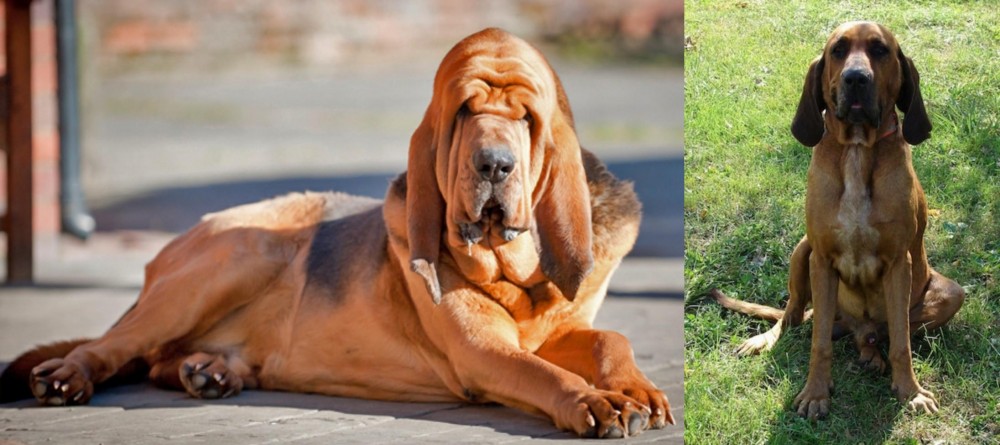 Bloodhound is originated from United Kingdom but Majestic Tree Hound is originated from United States. Bloodhound may grow 22 cm / 8 inches shorter than Majestic Tree Hound. Bloodhound may weigh 22 kg / 49 pounds more than Majestic Tree Hound. Bloodhound may live 5 years less than Majestic Tree Hound. Bloodhound may have more litter size than Majestic Tree Hound. Both Bloodhound and Majestic Tree Hound requires Low Maintenance.
Bloodhound is originated from United Kingdom but Majestic Tree Hound is originated from United States. Bloodhound may grow 22 cm / 8 inches shorter than Majestic Tree Hound. Bloodhound may weigh 22 kg / 49 pounds more than Majestic Tree Hound. Bloodhound may live 5 years less than Majestic Tree Hound. Bloodhound may have more litter size than Majestic Tree Hound. Both Bloodhound and Majestic Tree Hound requires Low Maintenance.
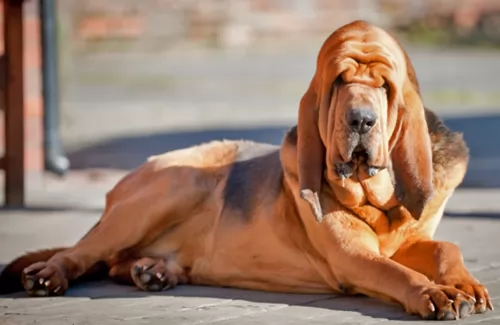 The history of the Bloodhound breed is a fascinating one. Known as a Sleuthhound for its ability to smell out the culprit and bag the prey. Even more so the Bloodhound is known for tracking and finding lost people. He is famous for finding human scents and being able to follow them even days or weeks after the person is lost. They are also able to track people over a great amount of land and have been known to successfully track escaped prisoners or wanted criminals. They are descended from the Saint-Hubert Hounds that were bred at the Abbey/Monastery at Saint-Hubert, Belgium. According to the legends the St. Hubert hounds were bred by the Monks in 1000AD. This hound was thought to be a mixed breed rather than a purebred. That’s because the ancestry of this hound is not really known but it is known that the monks bred them and sent several to the King of France annually. Only black hounds were gifted.
The history of the Bloodhound breed is a fascinating one. Known as a Sleuthhound for its ability to smell out the culprit and bag the prey. Even more so the Bloodhound is known for tracking and finding lost people. He is famous for finding human scents and being able to follow them even days or weeks after the person is lost. They are also able to track people over a great amount of land and have been known to successfully track escaped prisoners or wanted criminals. They are descended from the Saint-Hubert Hounds that were bred at the Abbey/Monastery at Saint-Hubert, Belgium. According to the legends the St. Hubert hounds were bred by the Monks in 1000AD. This hound was thought to be a mixed breed rather than a purebred. That’s because the ancestry of this hound is not really known but it is known that the monks bred them and sent several to the King of France annually. Only black hounds were gifted.
Some kings preferred not to hunt with these hounds thinking them not good enough while others thought the only use for them was as a leash hound. All described the St. Hubert as long in body with short legs. These gifts continued until the French Revolution when hunting in France was greatly reduced until the 19th century. The original St. Hubert strain became extinct in the 19th century and that the current European St. Hubert hound has its origins in the Bloodhound. The Bloodhound as a separate breed was already established in Europe by the middle of the 14th century. They were used as leach hounds to sniff out the prey so that the pack hounds could chase and keep it “at bay”. They were also used from the beginnings of the breed to track humans. At this time they were often known as sleuth hounds. As recorded by John Caius – the authority on Bloodhounds from their origins – writes about the breeds ability to find and track the scent of blood – thus becoming the Bloodhound and its use to track poachers and thieves. He also reported that the Bloodhound and the Sleuth Hound were the same basic breed. The number of Bloodhounds in Britain gradually declined until few remained after World War II. Britain has gradually built their breed back up by importing dogs from America. It was during the 19th century that the Bloodhound was imported into France by breeders who wished to reestablish the St. Hubert Hound. Thus the St. Hubert is both the ancestor and descendent of the Bloodhound. The Britain’s continue to believe that the Bloodhound is a native British breed.
The Bloodhounds in America have had great success as companion animals, with police departments and forest rangers and showing in the prestigious Westminster Kennel Club in New York. There are more Bloodhounds in the United States than anywhere else in the world.
In the end the Anglo-Saxton Bloodhound cannot be specified with any real certainty. Many believe it was not the St. Hubert that the Bloodhound descended from but rather the Norman hound or the sleuth-hound. Many believe it could have included other breeds such as the southern hound, the dun-hound and the Talbot. It cannot be proven today it the Bloodhound’s origins come from Belgian or England.
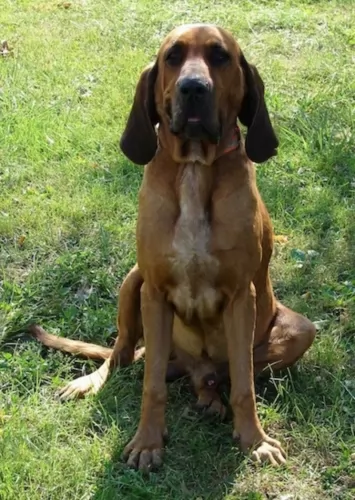 The Majestic Tree Hound is a fairly new crossbreed dog. While the actual breed is very recent, the stem stock goes way back to medieval times.
The Majestic Tree Hound is a fairly new crossbreed dog. While the actual breed is very recent, the stem stock goes way back to medieval times.
The dog’s heritage goes back to the St. Hubert Hound named after Francois Hubert. He bred the best scenting hounds in Southern France.
In fact when France experienced political unrest that resulted in emigration to the United States, they brought their dogs, among them hound dogs which were then crossed with other dogs. Bloodhounds, English Foxhounds, American Coon and Big Game Hounds have all contributed to the Majestic Tree Hound after a long time of breeding to bring forth a hound that had sharp scenting abilities as well as a balanced temperament.
The origin of the Majestic Tree Hound is the United States.
Today they are not seen much outside the United States. The first Majestic's were registered with the National Kennel Club in April 1980.
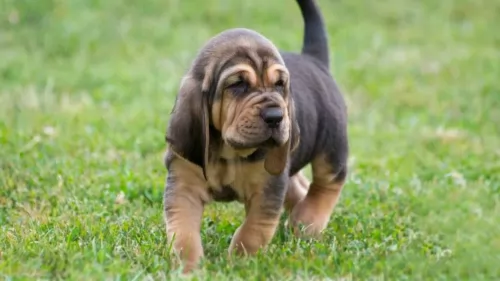 When being judged for confirmation in a show ring, the preference is for a larger dog, with an unusual skeleton in respect to its large size and heavy weight in the bones. They have a narrow head, flat at the sides, but long. They have deep set eyes buried in the deep, long face and wrinkles. The eyes might be yellow or run the gamut to deep hazel depending upon the color of the dog. The long velvety ears and thin and low set on the head. These long ears are as much a part of the Bloodhounds Olfactory system as his amazing nose. They curl backward and inward as the ends. There is a large amount of loose skin on the head and at the jowls. When the Bloodhound lowers his head the loose folds and ridges of skin are prominent on the face and forehead.
When being judged for confirmation in a show ring, the preference is for a larger dog, with an unusual skeleton in respect to its large size and heavy weight in the bones. They have a narrow head, flat at the sides, but long. They have deep set eyes buried in the deep, long face and wrinkles. The eyes might be yellow or run the gamut to deep hazel depending upon the color of the dog. The long velvety ears and thin and low set on the head. These long ears are as much a part of the Bloodhounds Olfactory system as his amazing nose. They curl backward and inward as the ends. There is a large amount of loose skin on the head and at the jowls. When the Bloodhound lowers his head the loose folds and ridges of skin are prominent on the face and forehead.
For many centuries all different colors of Bloodhounds could be found. Today however they are pretty much red, black and tan and black and liver. The Bloodhound is a powerful dog and is larger than most breeds of hounds.
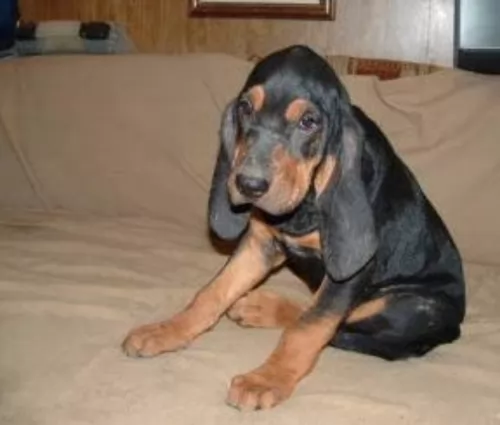 The Majestic Treehound is a large sized working dog. This dog is a cross between the Bloodhound and the Black and Tan Coonhound. Both male and female stand at roughly 61-76 cm in height and weighs in at about 33 – 50kg.
The Majestic Treehound is a large sized working dog. This dog is a cross between the Bloodhound and the Black and Tan Coonhound. Both male and female stand at roughly 61-76 cm in height and weighs in at about 33 – 50kg.
If you want your dog to become a parent, you can expect between 2 to 6 of the cutest puppies.
The coat is smooth, short and dense and comes in a number of colors such as black, black and tan grey and white as well as red and blue ticking.
The dog has sunken brown or yellow eyes, particularly long, floppy ears, a deep chest and a long tail. The tail is set high and is thick at the base and is essentially carried in accordance with the dog’s mood. The tail is never carried over the back. There was a time when the tail of the Majestic was docked, giving him an attractive, compact look. They are powerfully built dogs with a dignified look to them.
The Majestic Treehound has always been a most fearless and adept hunter and he is a dog that just loves being busy. They are also loyal and devoted companions for their human families.
He is a huge dog but he is gentle, good natured and kind with children and is also willing to get on well with pets in the home. You won’t find him being much of a guard dog though because he is just too friendly for this.
He is a dog that is going to need regular exercise, and his sheer size and exercise requirements will make it that he is better off living in the countryside than in the city.
He is an intelligent dog who will be easy to train. Training and socialization will be good for him as he knows exactly how to behave in different situations. He doesn’t want to be left on his own for too long because he bonds closely with his owners and wants to be around them constantly.
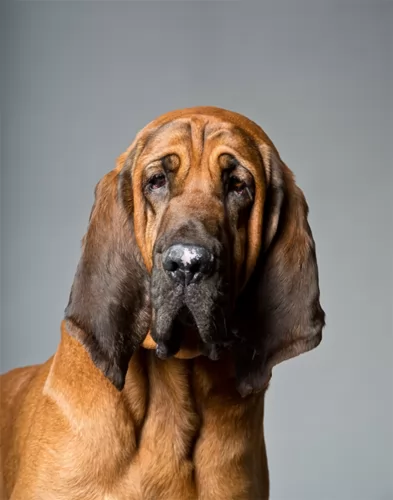 The Bloodhound is known as a gentle soul and he truly is. They are affectionate and gentle with people and children. However, their strong will to track can make them stubborn and hard to handle and train. They are easy going dogs and really like to be with people, children and other dogs. They are affectionate but tend to be set in their ways.
The Bloodhound is known as a gentle soul and he truly is. They are affectionate and gentle with people and children. However, their strong will to track can make them stubborn and hard to handle and train. They are easy going dogs and really like to be with people, children and other dogs. They are affectionate but tend to be set in their ways.
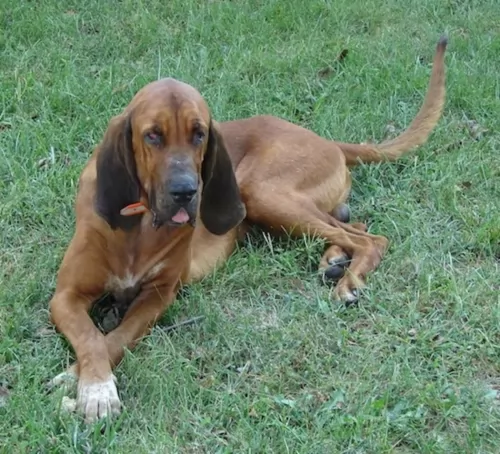 This large attractive dog has a gentle nature and is loving and affectionate towards his human family, getting on well with children and other pets in the family.
This large attractive dog has a gentle nature and is loving and affectionate towards his human family, getting on well with children and other pets in the family.
As with most little dogs, this big dog doesn’t like to be left alone for a long time. With training and socialization he becomes obedient and amicable, knowing how to behave well so that he can be taken anywhere.
Treat this loving dog with love and care and he is guaranteed to make you a splendid family pet.
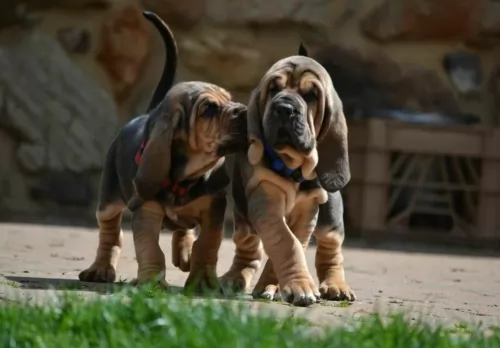 Obviously with ears like the Bloodhound there is always a chance for problems and serious infections. The ears need to be cleaned daily. Because their coat is so thick, they can overheat easily, and they are very prone to bloat, as are many large animals. However, with the Bloodhound, Bloat is the number one killer. Their lifespan is one of the shortest of all dogs at 6.75 years.
Obviously with ears like the Bloodhound there is always a chance for problems and serious infections. The ears need to be cleaned daily. Because their coat is so thick, they can overheat easily, and they are very prone to bloat, as are many large animals. However, with the Bloodhound, Bloat is the number one killer. Their lifespan is one of the shortest of all dogs at 6.75 years.
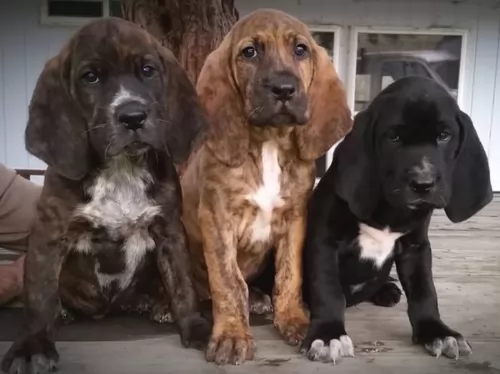 The Majestic is a robust breed, and with good food and exercise he can live to be between 10 and 13 years of age.
The Majestic is a robust breed, and with good food and exercise he can live to be between 10 and 13 years of age.
It has been discovered that like many other dogs, he can battle with hip dysplasia. Large dogs are more prone to hip dysplasia. It is an abnormal formation of the hip socket. It’s a serious condition that can cause arthritis and lameness.
Hip dysplasia often begins when a dog is still a puppy. One of the symptoms is difficulty with getting up after lying down, pain in hip joints and even loss of muscle mass. You will need to get your pet to the vet. The vet will perform a complete physical exam on your dog and then talk to you about treatment.
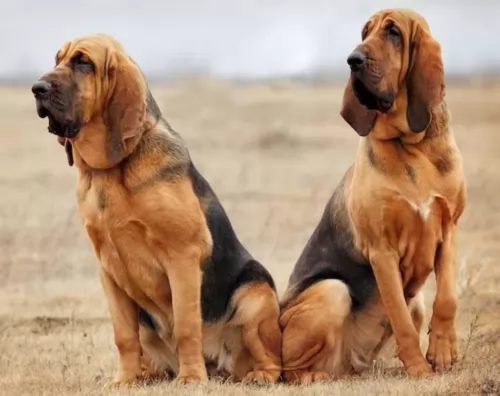 The Bloodhound is not a high energy, fast moving dog but that does not mean he doesn’t have serious nutritional needs. An overweight Bloodhound is on a course to an early demise. They should be fed a high-quality food once a day or split into two daily servings. Do not feed them right before or right after strenuous exercise and remember that strenuous exercise for a Bloodhound is considerably less than it is for a terrier.
The Bloodhound is not a high energy, fast moving dog but that does not mean he doesn’t have serious nutritional needs. An overweight Bloodhound is on a course to an early demise. They should be fed a high-quality food once a day or split into two daily servings. Do not feed them right before or right after strenuous exercise and remember that strenuous exercise for a Bloodhound is considerably less than it is for a terrier.
As previously mentioned the number one cause of death in Bloodhounds is Bloat. They are also prone to cancer. They have minor issues with their eyes, but their ears and skin are also major concerns. Clean the ears daily and wipe out the skin folds and wrinkles to prevent infections. They should be test for hip and elbow dysplasia simply because they are large dogs, though these conditions are less common in Bloodhounds.
Though the Bloodhound is known as a couch potato his stamina and activity levels are usually greatly underestimated. He can follow a scent for 7-10 hours over miles of terrain with out a problem. He needs daily exercise such as long walks on a leash. Do not take your Bloodhound out off leash because if he picks up a scent and wanders off you will not be able to get his attention to call him back.
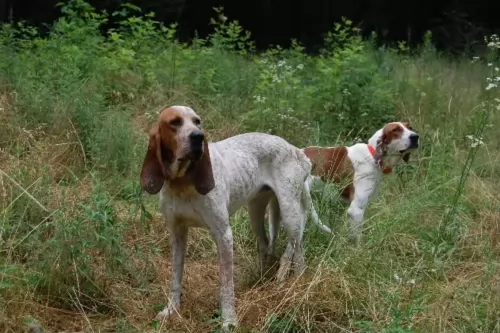 Occasional brushing, perhaps twice a week, will be enough to maintain this dog’s short coat. The long ears tend to drag on the ground, collecting dirt and moisture, and the ears particularly will need to be washed or wiped down and checked inside for infection.
Occasional brushing, perhaps twice a week, will be enough to maintain this dog’s short coat. The long ears tend to drag on the ground, collecting dirt and moisture, and the ears particularly will need to be washed or wiped down and checked inside for infection.
This is a dog with high exercise requirements. A walk a day for him is a good thing but it won’t be enough – he will need some rough and tumble games and want to join you on hikes, swimming and jogs.
Majestic Tree Hounds require nutritious food. If you want to use commercially manufactured food, make sure its the better one as some of the cheaper brands put fillers, preservatives and colorants in and this can cause a whole lot of damage for your dog.
Buy quality food for your pet. The idea is to keep things simple for your big dog so that he doesn’t succumb to digestive problems. Apart from top quality kibble, homemade food will be excellent for him. Boiled chicken cooked in some coconut oil with some brown rice and pasta and some cooked or raw vegetables will be delicious for your dog. You can add it to his dry kibble. Remember to ensure he always has cool, fresh water.